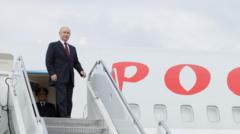The recent high-stakes meeting between US and Russian delegations in Alaska has concluded, leaving observers with a nuanced understanding of the ongoing diplomatic landscape. Far from delivering immediate breakthroughs, the summit appears to have primarily served as a platform for continued dialogue, underscoring the complexities inherent in the relationship between the two global powers. Analysis of the outcomes points to several key takeaways.
Firstly, a definitive ceasefire regarding ongoing conflicts was not achieved. This lack of a resolution on a critical issue suggests that fundamental disagreements persist and that the path to de-escalation remains arduous. The summit thus highlighted the deep divisions that continue to challenge international stability.
Secondly, an invitation extended for further talks in Moscow indicates that despite the lack of immediate tangible results, both sides are committed to maintaining open channels of communication. This willingness to continue diplomatic engagement, even without quick fixes, signals a recognition of the need for ongoing dialogue to manage geopolitical tensions.
A third significant takeaway is the overall sentiment of uncertainty that followed the discussions. The summit generated more questions than clear answers, implying that many critical issues remain unresolved and require further negotiation. This ambiguity underscores the incremental nature of high-level diplomacy in complex international relations.
Fourthly, the meeting underscored the enduring nature of strategic competition between Washington and Moscow. While dialogue is essential, the summit did not fundamentally alter the competitive dynamic, suggesting that both nations will continue to pursue their respective interests, albeit with an open line for communication.
Finally, the Alaska summit can be viewed as a foundational step rather than a conclusive event. It set the stage for future discussions and laid bare the intricate challenges that demand sustained diplomatic efforts. Its true impact may only become clear as subsequent engagements unfold, reinforcing the idea that progress in such sensitive geopolitical contexts is often a gradual process.



